Hunger Crisis Appeal
Away from the headlines, conflict and climate extremes have forced more than 55 million people* across East Africa into malnutrition and even starvation. Will you unite with communities against this hunger crisis?
We shared food and what we had together.”
Watch Netsanet’s story from Adigrat, northern Ethiopia.
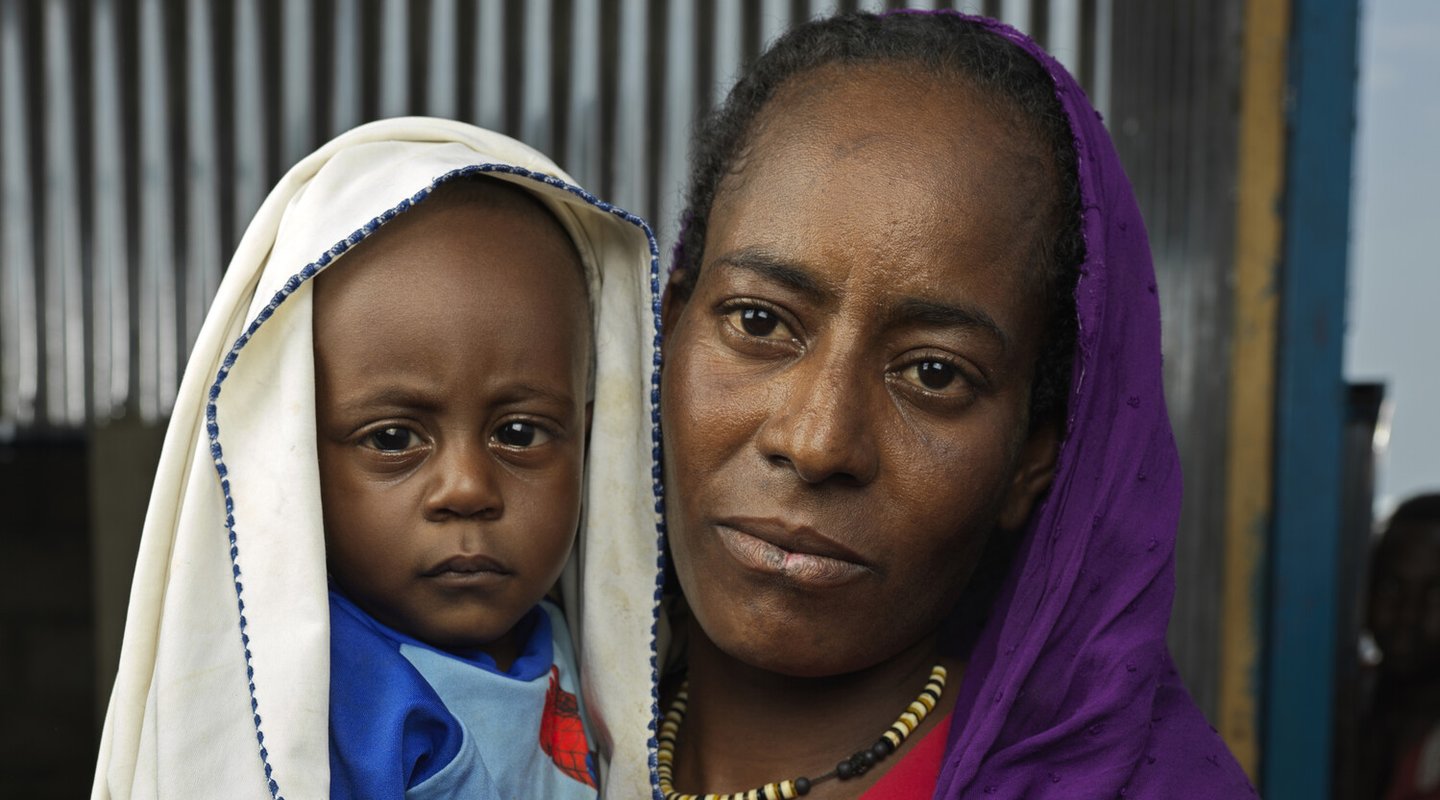
Zinab Alzaki Mohammed Alnur, 20, a refugee displaced by the war at an NFI distribution at the transit centre in Renk, South Sudan.
Join Zainab
Renk, South Sudan
"War can displace people whether we like it or not. But we must be safe."
Zainab and her son escaped Sudan's conflict but left behind their home and thriving business.
“Our house was in the middle of the city and everything started there. I did not know where to go, fighting, gunshots and bombs surrounded us all.”
Zainab and her husband owned a popular restaurant in Sudan’s bustling capital, Khartoum. Her sons went to school and played sports with their friends. Life was good. But all of this changed when conflict erupted and Zainab and her family found themselves forced from their home.
“I saw people dying outside my home and in the neighbourhood. Every night for 15 minutes, we heard jet fighters fly overhead and drop bombs. For our safety, we continued to sleep under our beds because we were afraid of what might happen.”
Separated from her husband and older son, she and her youngest son fled for their lives. Zainab survived due to the kindness of strangers.
“Fortunately, a vehicle helped some of the way by giving me a lift. I owe a lot to them. My neighbours in Renk helped settle my mind with songs and stories and told me my husband would be okay.”
Thankfully, her husband and other son made it out and the family has now been reunited.
Like more than 600,000 people who have crossed the border at Renk, Zainab came in search of safety. But having escaped the conflict she found herself facing a worsening hunger crisis. You see, far from being the safe haven Zainab wished for, South Sudan is itself experiencing extreme food shortages and spiralling cost of living.
“We had no option but to come here. War can displace people whether we like it or not, but we must be safe.”
Through the work of local Oxfam teams, Zainab was able to get clean water and emergency cash, ensuring she had the dignity and the choice to buy whatever her family needed.
“I have received buckets, soaps and cash assistance to help me purchase food for my children. After months, this is the first time I have received any services.”
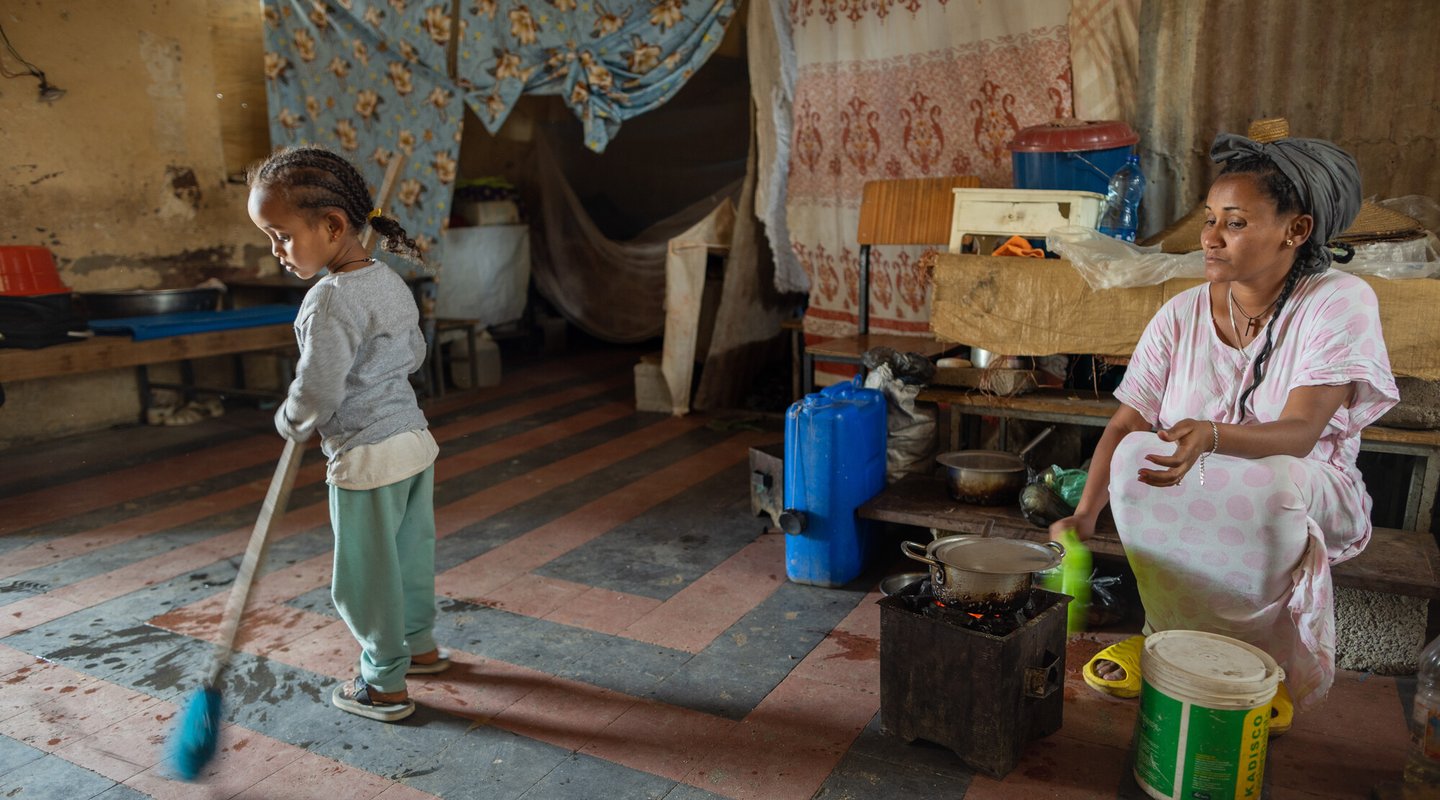
Netsanet, a participant in the Oxfam support program, preparing a meal for her child at their makeshift home in Tigray, Northern Ethiopia. Photo: Petterik Wiggers/Oxfam
Join Netsanet
Adigrat, Ethiopia
"I had a fully equipped hair salon. I did very well in my business and even employed three workers to support me.”
Netsanet and her young daughter fled the fighting that destroyed her home village of Humera. Her home, her business, her security, her whole way of life were ripped away overnight. The conflict, combined with worsening drought and failed crops, have triggered food shortages, widespread starvation and even deaths.
“While on the road, we used to hide in the forest for our safety, we were hungry and had to look for food everywhere…I was pregnant and because of the lack of food, I lost my child.”
Her search for safety took her 490 kilometres from home, eventually arriving in the town of Adigrat, where the local community is hosting people who have been displaced in a local school. It is here that Netsanet met members of local Oxfam partner Relief Society of Tigray or ‘REST’.
“After [I met REST] there was good improvement. We received money split into two payments, which we used for urgent supplies.”
Netsanet was able to buy much-needed food supplies for herself and her daughter. She shared what she had with other families.
“I couldn’t bear to see my child eat while others slept without food. Even though not everyone could get the cash because it was not sufficient for all, we shared food and what we had together.”
Alongside the cash, Netsanet received vital nutritional training on the best food to eat as she and her daughter recovered from malnutrition, so she was able to decide for herself what supplies to buy for her family.
“I bought my daughter shoes and clothes and fed her a balanced diet such as eggs, rice, and vegetables, just like I was trained to do.”
This training has brought some protection against hunger, but also renewed hope for the future.
“The first thing is I want to return to my hometown...on returning I want to work so I can be self-sufficient…to take my daughter [back] to school and provide whatever she needs…”
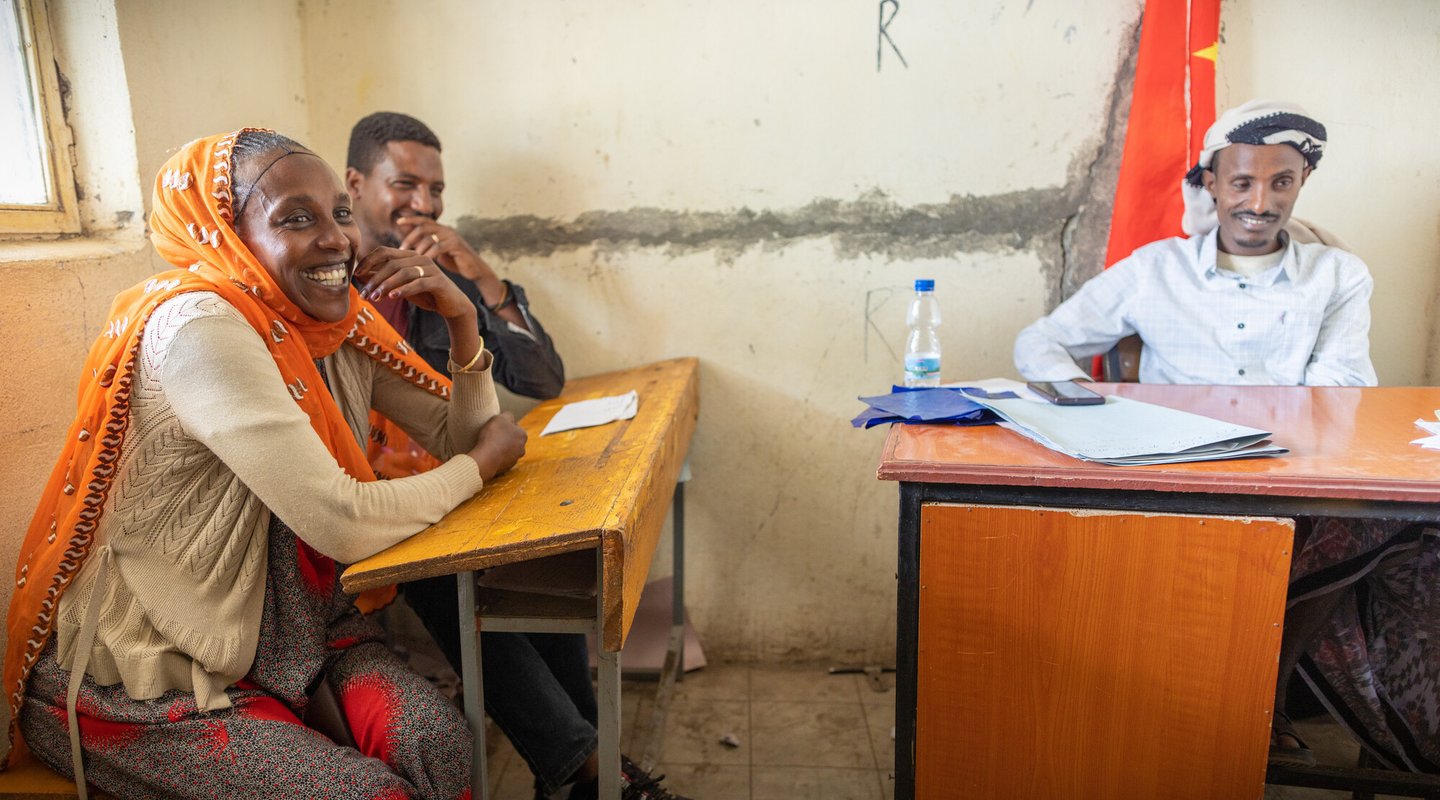
Etsay at a community meeting to support women to better cope with crisis, Mekoni, Ethiopia. Credit: Petterik Wiggers/Oxfam.
Join Etsay
Mekoni, Ethiopia
"The war was accompanied by drought, causing huge suffering. We were about to harvest our sorghum but it was totally destroyed by the flood. Our livestock were also killed."
Etsay lives in Mekoni. She’s a farmer, a parent and now a driving force of recovery in her community. Her village has been hit by successive disasters, most recently flash-flooding which destroyed her crops and killed her livestock. It’s evidence, if any more were needed, that the climate crisis continues to hit the people least responsible first and hardest.
“The war was accompanied by drought, causing huge suffering. We were about to harvest our sorghum but it was totally destroyed by the flood. Our livestock were also killed.”
To have worked so hard after so much suffering only to see your harvest washed away, would be too much for most people. But Etsay’s story doesn’t end there.
She survived the initial crisis thanks to vital emergency food distributions from Oxfam’s local partner in the area, Mums For Mums. With some of the cash she received, Etsay and her neighbours set up a community savings and loan scheme to support each other as they start the long road to recovery.
“[We] were able to start a self-help group targeting female-headed households. We started saving, contributing [a small amount] each week. I was able to buy five chickens. It isn’t much, but it is a start.”
Today, Etsay is working as a volunteer in her community, encouraging more women to start their own savings schemes.
“I wanted to be a voice for my community, I wanted to stand up for those who couldn’t stand up for themselves.”
Please don’t wait. Your gift today can help people confronting this hunger crisis to:
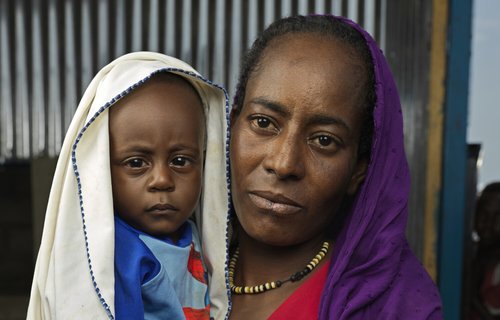
£25 Buy food with emergency cash
You can help people fight hunger with emergency cash to buy food and other urgent supplies such as medicines and clothes.
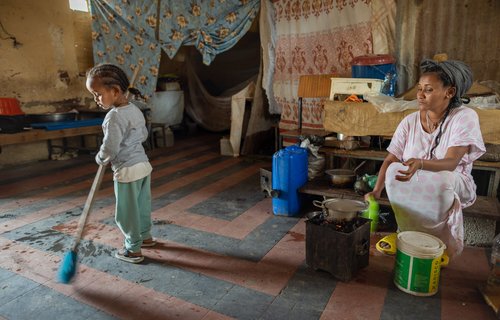
£50 Protect themselves against malnutrition
You can support nutritional training on the best foods to help recovery from malnutrition, especially for parents with young children.
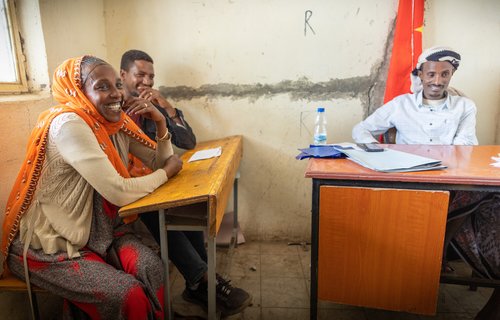
£80 Start community saving schemes
You can help back community-led projects such as savings and loan schemes, that will build resilience and replace lost crops.
It’s no coincidence that, of the 25 countries experiencing the greatest threats from climate change, 14 are also experiencing conflict. This is a global injustice.
Global pollution leads to rising temperatures, causing drought, flooding and unpredictable weather.
Food, land and water are disappearing, pushing more and more people deeper into hunger, starvation and poverty.
The changing climate fuels conflict in countries already facing crises, making climate adaptation even more difficult.
The Oxfam Difference
Oxfam offers our supporters a different kind of charity: a unique community-led approach that confronts the causes and consequences of poverty. Because this connected approach is the best way to end the injustice of poverty.
Farmland in Tigray, Ethiopia, which has been hit by devastating flooding and catastrophic drought. Photo: Petterik Wiggers/Oxfam.
Ending the global causes
From unfair tax rules to fossil fuel emissions, you’ll be backing campaigning work to end the unjust policies and practices that cause poverty and suffering in the first place.
Oxfam workers pump water into large tanks to provide daily access to clean water for refugees in Renk, South Sudan. Photo: Peter Caton/Oxfam.
Confronting the daily consequences
You’ll be supporting community-led responses to the daily reality of poverty, from disaster relief to solar-powered water pumps, to innovative climate-resistant farming techniques.
With every donation you are joining forces with people worldwide against the causes and consequences of poverty. It’s a different kind of charity for a radically fairer world.
*source: United Nations Office for the Coordination of Humanitarian Affairs (OCHA)
Tereza Joseph Makuach Jak, 38, from the host community that supports people fleeing conflict in Renk, South Sudan. Photo: Peter Caton/Oxfam.
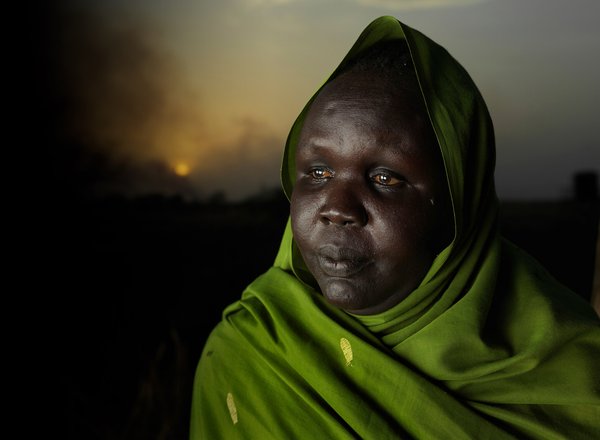
Donate today